Key takeaways:
- Wealthtech is the use of technologies like artificial intelligence, big data, data analytics, and machine learning in wealth management services.
- The wealthtech market includes robo-advisors, robo-retirement tools, digital brokerages, micro-investing and algorithmic trading platforms, and B2B software.
- 88% of wealth managers think technology adoption will significantly impact the evolution of wealth management in the financial sector.
- Wealthtech adoption challenges include customer expectations toward personalization, cybersecurity, and compliance.
- Adopting wealthtech can improve system maintainability, scalability, and cost-efficiency while improving client experience, operational efficiency, and decision-making.
The wealthtech solution market size is projected to reach $18.6 billion by 2031, at a CAGR of 14.8% from 2022 to 2031.

Wealthtech solution market projection
Financial planning solutions are the number one upcoming investment for wealth managers, with 54% planning to invest in one within a year. The runners-up are customer relationship management (CRM) systems (50%) and client reporting and analysis software (44%).
If you’re considering adopting wealthtech, here’s everything you need to know about it, from challenges to key services and wealthtech benefits.
What is wealthtech?
But first: what is wealthtech? A portmanteau of wealth technology, this term refers to using technology in wealth management to offer innovative wealth management services or streamline existing workflows with digital tools.
Wealthtech is considered a segment of financial technology (fintech).
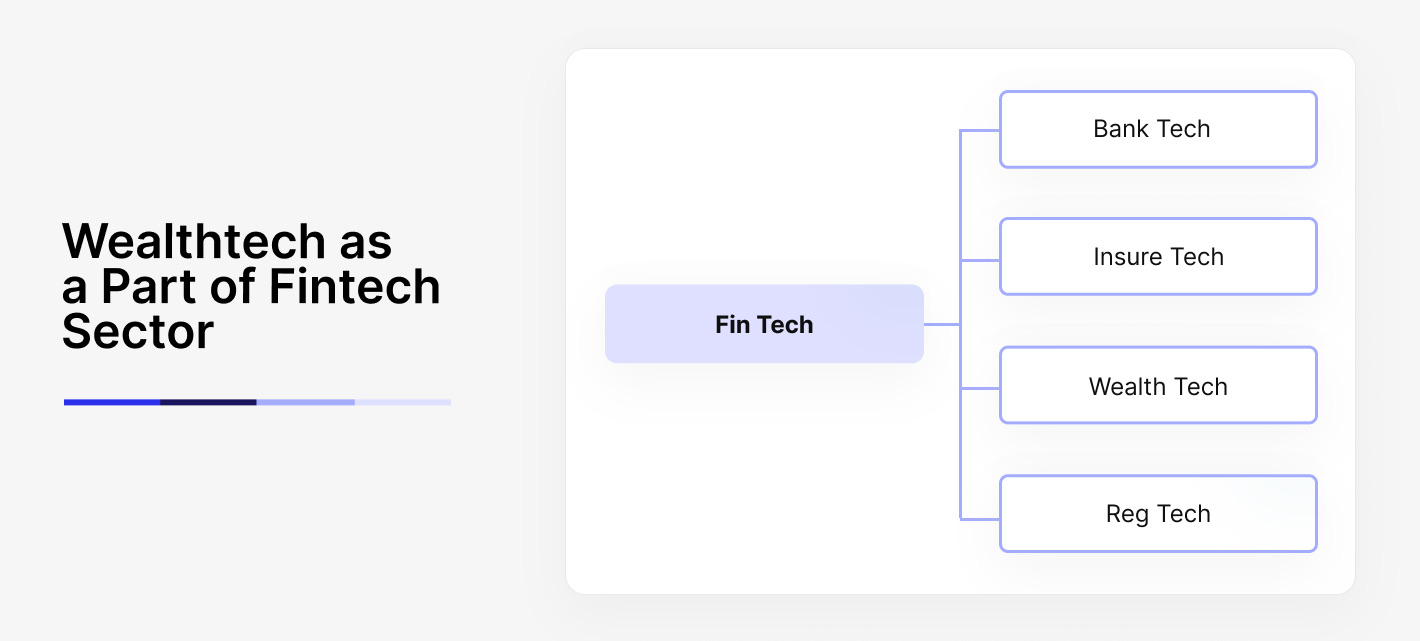
Wealthtech as a part of fintech
Adopting wealthtech can entail:
- Developing automated consumer solutions for financial advice and financial estate planning
- Switching to cloud-based services
- Offering digital-first investment platforms
What’s the difference between wealthtech and traditional wealth management?
Let’s start with the definition of wealth management. Researcher Tomasz Dziawgo defined it as designing and implementing a tailor-made strategy to manage the client’s assets, both liquid and illiquid.
Wealthtech, in its turn, means using technologies like artificial intelligence, data science, data analytics, and machine learning to design and develop those tailor-made strategies. For example, fintech platforms can automate or streamline stock market analysis.
4 challenges of adopting innovative wealth management solutions
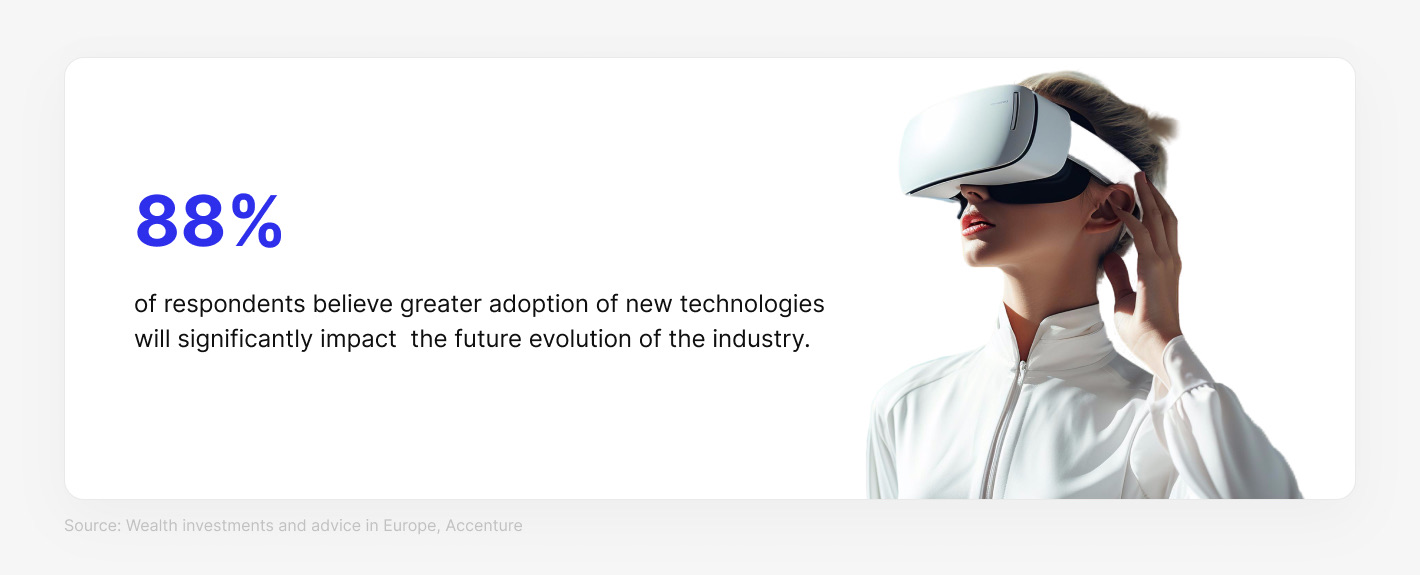
88% of institutional and private wealth managers agree that technology adoption will significantly impact the industry’s evolution. That said, digitizing wealth management isn’t without challenges:
- Lack of personalization. Customers expect tailored advice, and digital wealth management platforms have to deliver that personal touch.
- Poor user experience. Convoluted, unintuitive user flows will only hinder the adoption and efficiency of digital platforms.
- Weak security and compliance. Security incidents, data breaches, and non-compliance can lead to fines and reputational losses.
- Misunderstanding of the user background. The average advisor is in their 50s. A lack of digital literacy may cause resistance to change and nullify the efficiency of top wealth management platforms.
Need an expert to help you overcome wealthtech transformation challenges? Contact us to discuss how we can help you drive innovation with the right solution to your unique challenges.
How technology is transforming wealth management
As of Q1 2023, wealth technology adoption is now an industry trend, with 54% of financial advisors planning to invest in wealthtech solutions within a year.
Here’s how specific technologies are transforming wealth management:
- Cloud: minimizing infrastructure costs while enabling high uptime, performance, and scalability
- Data analytics: analyzing large swaths of data for suggesting investment and portfolio strategies and predicting market movements.
- Artificial intelligence: personalizing financial advice, enabling chatbots and virtual assistants for analyzing every aspect of the client’s situation.
Several wealthtech companies have already emerged as key players in the industry, including:
- Addepar, a wealth management platform for technology financial advisors and wealth managers that helped manage $2.5 trillion across 25 countries in 2021
- Avaloq, a Swiss cloud-based solution provider for banks and wealth managers.
- Robinhood, an online trading platform with market capitalization of $8.32.
5 key responsibilities of wealth technology leaders
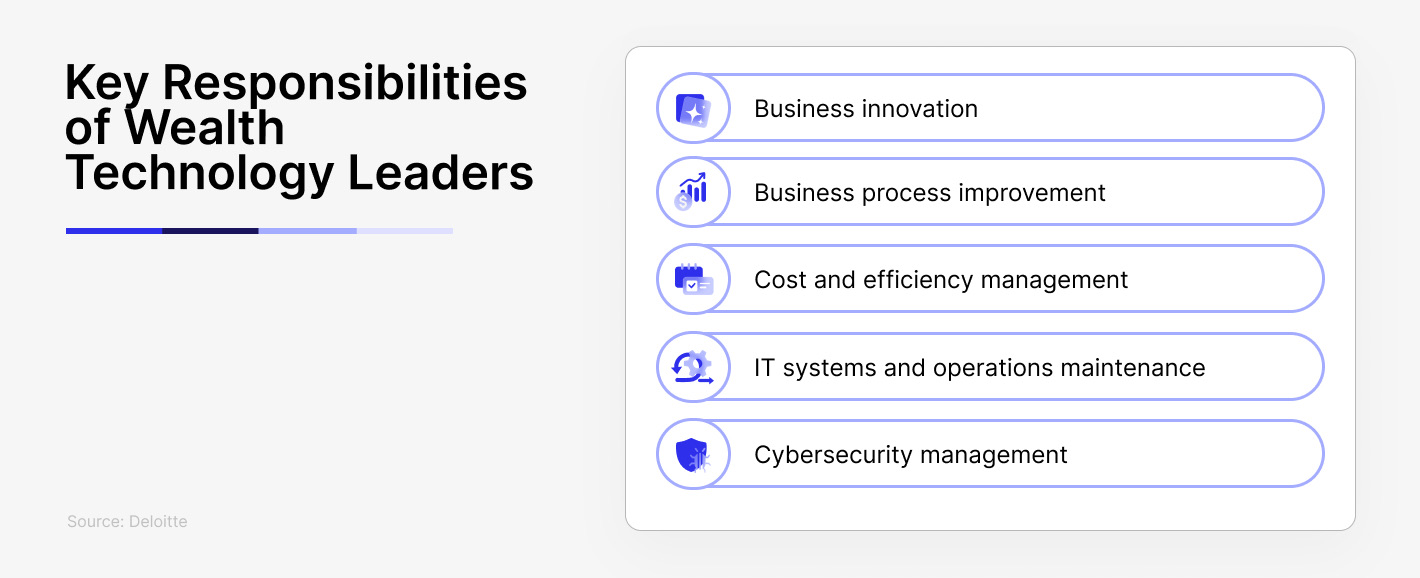
Key responsibilities of wealth technology leaders
To make wealth management technology adoption successful, wealthtech leaders have to take on the following five responsibilities, as outlined by Deloitte:
- Business innovation: evolving the business model with new fintech and wealth management solutions
- Business process improvement: revamping existing workflows using wealth management and fintech solutions
- Cost and efficiency management: optimizing costs and maximizing development, testing, and maintenance efficiency
- IT systems and operations maintenance: ensuring all systems are up-to-date and high-performing
- Cybersecurity management: maintaining security and regulatory compliance
6 wealthtech services that are shaping the wealth management industry
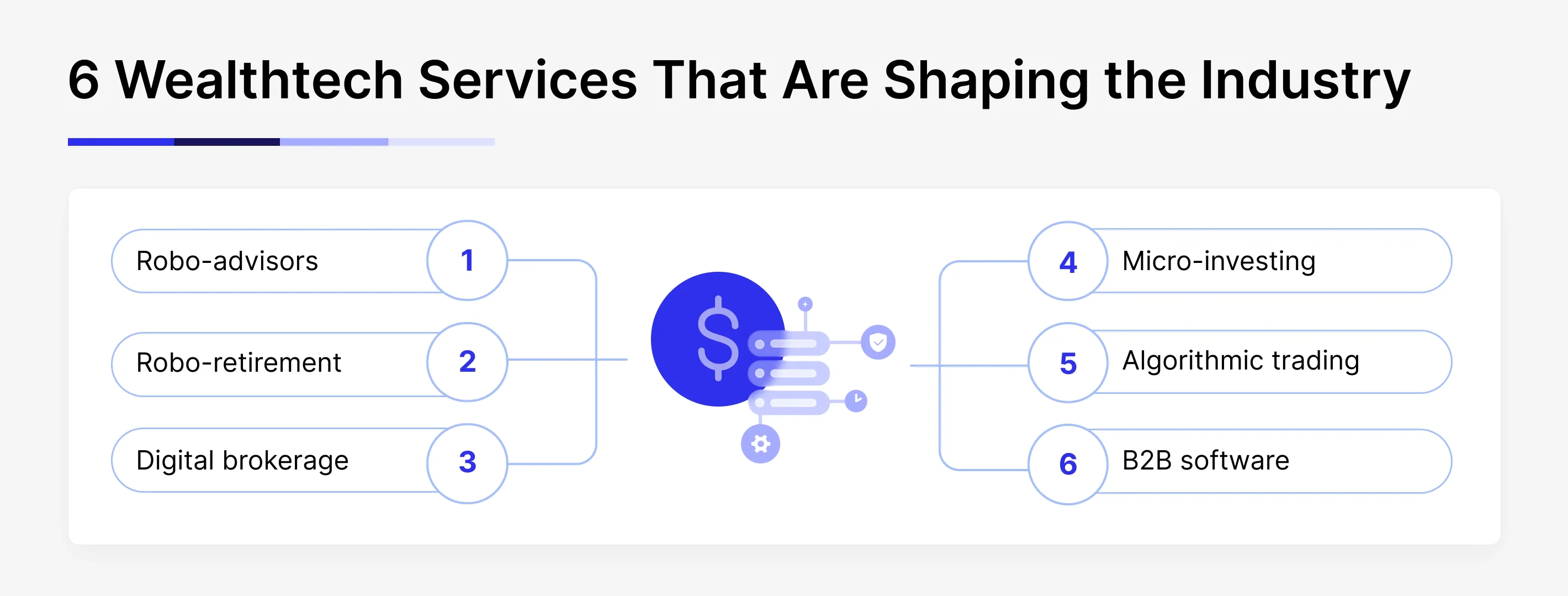
Wealth technology is giving rise to new solutions and services across the industry, from banking and financial advisors to wealth managers. Here are six of them that harness the power of fintech in wealth management – and transform it into cutting-edge offerings for clients.
Robo-advisors
A robo-advisor is an AI-powered chatbot or virtual assistant that’s designed to help users achieve financial goals, manage assets, and grow wealth. This wealthtech service is essentially an automated financial advisor offering holistic financial planning and portfolio management tools.
Without a human presence required, a robo-advisor can deliver financial advice 24/7, at a lower cost. It’s also more objective and accurate thanks to big data analytics, artificial intelligence, and machine learning.
Robo-retirement
Robo-retirement is a robo-advisor service designed specifically for helping users plan for their retirement, from accumulating savings to growing them through investment.
Robo-advisory wealth management platforms like Betterment and Wealthfront can provide retirement planning and investment advice for retirement savings. However, the solutions market has yet to see the emergence of robo-retirement products.
Digital brokerage
Licenced wealthtech companies offer online broker solutions that serve as digital intermediaries between the investor and the asset market. The market in question can be a stock or currency exchange or a real estate market.
Instead of having to contact a human broker, users can manage their brokerage account online like they would a banking account. Plus, unlike some traditional players in the financial services industry, online brokers can have $0 or $1 account minimums and lower fees.
Micro-investing
To attract the next generation of wealth holders in the wealth management sector, wealthtech companies like Acorns and Stash offer users to invest spare change into stocks.
These solutions automatically round up the user’s expenses and turn the change into a fractional share investment. They also come with investment management tools to help users keep track of their investment portfolios.
Algorithmic trading
Algorithmic trading is a game-changer for wealth managers and clients alike. Using real-time data analytics powered by AI and machine learning, algorithmic trading solutions automatically buy or sell securities based on the market and portfolio data.
Sophisticated wealth management technology platforms have also predictive analytics technology for automatic portfolio rebalancing.
B2B software
Wealth management technology isn’t reserved only for consumer products. Using technology, investment firms, banks, financial advisors, and wealth managers can:
- Automate and streamline processes (e.g., by enabling straight-through processing)
- Reduce costs thanks to improved efficiency and technology benefits (e.g., by switching to a cloud-based infrastructure)
- Make better decisions for their clients and business (e.g., by using data analytics for portfolio analysis)
- Improve customer experience (e.g., by enabling higher personalization with the help of a CRM system)
But to reap any of these benefits, organizations need the tech talent to develop, implement, and maintain their wealthtech ecosystem. And tech talent shortage is a cross-industry challenge, with 73% of CIOs worried about talent attrition.
That’s why organizations may choose to look beyond in-house hiring to close the talent tech gap. For example, one of the world’s top-10 banks turned to Sombra to ramp up its tech capabilities while retaining the flexibility of quickly scaling the team.
As an experienced software development partner, Sombra carries domain knowledge in developing fintech solutions, like asset management and investment management fintech systems. Contact us to discuss how our tailor-made solutions can help you reap the benefits of wealth management technology.
10 benefits of wealth management technology
Wealth management technology platforms can help your organization reap numerous benefits, from accelerated time-to-market to reduced IT spending and improved operational efficiency.
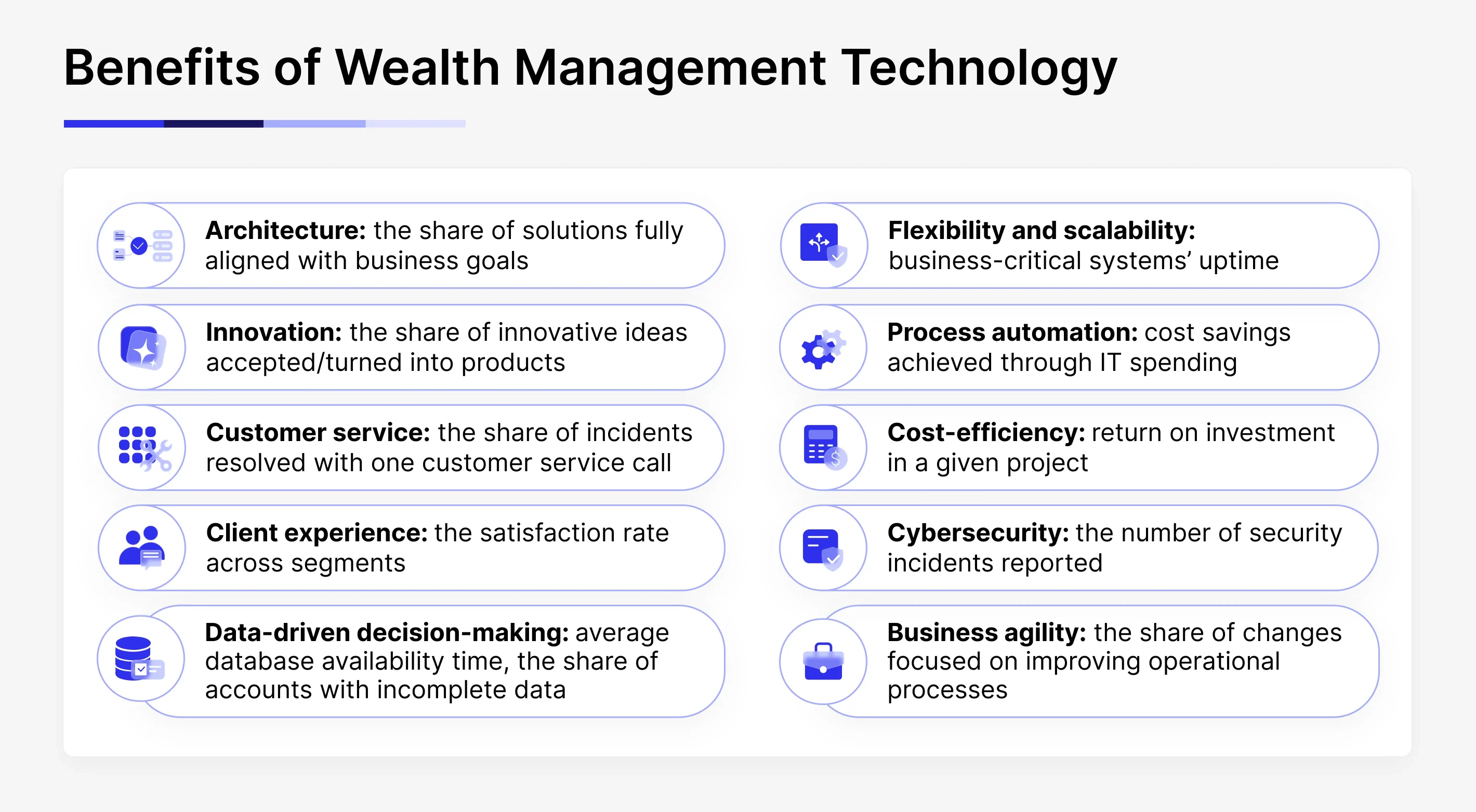
To effectively monitor the organization’s progress toward achieving these goals, we recommend tracking the following key performance indicators:
- Architecture: the share of solutions fully aligned with business goals
- Innovation: the share of innovative ideas accepted/turned into products
- Business agility: the share of changes focused on improving operational processes
- Client experience: the satisfaction rate across segments
- Process automation: cost savings achieved through IT spending
- Flexibility and scalability: business-critical systems’ uptime
- Data-driven decision-making: average database availability time, the share of accounts with incomplete data
- Cost-efficiency: return on investment in a given project
- Cybersecurity: the number of security incidents reported
- Customer service: the share of incidents resolved with one customer service call
Simpler architecture
The microservices architecture and API use enhance the maintainability and reusability of code. Process standardization allows for automation and minimizes human error. All of this, in turn, speeds up time-to-market, increases agility, and reduces costs.
Adopting wealth management technology can also mean fostering a seamlessly integrated ecosystem of solutions. This allows wealth technology companies to break data and initiative silos, have a 360-degree view of every customer, and make better decisions.
Shorter innovation loop
Implementing the latest financial technology best practices is the necessary foundation for innovating at a pace fast enough to keep up with changes. Those changes can include shifts in market trends, customer expectations, and regulations.
Wealthtech companies also have shorter feedback loops between the IT department and C-level management. This ensures that technology initiatives are well-aligned with business priorities and deliver tangible value to both end users and the organization.
Enhanced business agility
Fintech companies that adopt the agile methodology in developing and maintaining wealth management technology platforms deliver value faster and more cost-efficiently.
This methodology focuses on incremental delivery, business value realization, and better risk management and process transparency. Agile allows companies to promptly gain tangible value out of an initiative and quickly improve their financial services based on customer feedback.
Faster time-to-market enhances the organization’s resilience in the face of market turbulence and enhances flexibility and adaptability.
Improved customer experience
A hybrid approach to wealth and asset management is still the preferred one among consumers (only 17% would opt for fully digitalized financial advice). Such an approach includes virtual and human interaction.
So, wealth managers have to deliver a personalized, seamless client experience across all channels, digital and traditional ones.
A wealth management technology platform can consolidate all customer data in a single source of truth. A consumer wealthtech platform can also power digital interactions like facilitating access to investment opportunities, calculating current net worth, or tracking growth status. Financial advisors can then focus on value-added tasks.
Using machine learning algorithms, a CRM system can group customers into micro-segments, power hyper-personalization, and give a 360-degree view of every customer.
Streamlined business processes
Integrated into a wealth management technology platform, robotic and intelligent process automation can streamline repeatable, labor-intensive processes. As a result, wealth management firms can increase operational efficiency and shift focus to more value-added tasks.
For instance, wealth management tools can automate report generation, allowing the advisor to focus on communicating with the client. It can also save hours of research by aggregating all market data in one dashboard – so, the manager can focus on growing the wealth.
Enhanced flexibility and scalability
Migrating proprietary investment platforms and financial planning tools to the cloud allows organizations to:
- Gain more control over spending with a transparent pay-as-you-go cost structure
- Right-size computing resources to optimize costs while ensuring high uptime
- Focus on its wealth management technology while the cloud provider takes on infrastructure maintenance
However, a cloud-based platform for the wealth management market has to follow the latest cybersecurity best practices and comply with regulations.
Sombra’s DevOps and cloud expertise can help you continuously ensure your cloud-based infrastructure is secure with automated SAST, DAST, and IAST testing. We can also help you enhance risk discovery and mitigation and streamline development and deployment with DevOps best practices.
Need an expert helping hand in managing your on-premises, cloud, or hybrid infrastructure and ensuring its security? Contact us to discuss how we can help you futureproof your systems.
Better decision-making
With the help of artificial intelligence, predictive analytics, and big data services, employees across the organization can make better, data-driven decisions for the company and its clients.
For example, the executive managing director can use a wealth management technology platform to monitor customer retention or solution ROI.
Asset managers, in turn, can manage investments better with trading platforms that analyze a myriad of metrics, like Sharpe and Sortino ratios. With their help, managers can easily identify emerging opportunities or threats that may impact investing – and act accordingly.
Cost-efficiency
AI-powered financial planning advisors can serve customers around the clock, analyzing more data in a matter of minutes than any human can. Such a wealthtech platform can also derive insights into consumer behavior and market trends in real time and adjust its advice accordingly.
This makes AI a cost-efficient alternative to financial advisors, at least for run-of-the-mill financial and estate planning requests. However, it doesn’t have to replace human advisors: AI can complement them. Some wealth management fintech companies like Betterment and SoFi also provide access to financial in-person advisory in addition to robo-advisory.
Enhanced cybersecurity
A successful wealthtech and fintech transformation requires a comprehensive security audit of existing investment and wealth management systems and infrastructure. Only with the security failings addressed, new wealth technology solutions can be safely developed and deployed.
Maintaining the security of digital wealth management and investment tools and infrastructure should be a continuous effort that includes:
- Assessing potential security risks at the planning stage of the software development life cycle
- Introducing continuous automated security testing that enables financial solutions to remain secure
- Conducting regular code reviews and security audits
Improved customer service
Traditionally, financial advisors and companies have multiple disparate systems existing in silos. Wealthtech companies, on the other hand, strive to maintain a digital wealth management ecosystem where those systems are tightly integrated.
By securely sharing data via APIs, legacy systems can be integrated into a single customer service desk. This allows customer service to have a complete overview of each customer’s details, preferences, and interaction history.
With the help of artificial intelligence and big data, this consolidated information can also be used to power personalization-at-scale and analyze trends in customer interactions.
How can Sombra help you reap wealthtech benefits?
Reaping all the benefits listed above is impossible without the right tech expertise. If you don’t have it in-house – or simply want to make your wealthtech project more cost-efficient, – our skills are at your service.
At Sombra, we have the right combination of fintech industry expertise and technical skills to deliver quality custom solutions. With our financial software development services, you get a fully compliant, scalable, and secure product seamlessly integrated into your ecosystem. We can also advise you on digital transformation and maintain your existing infrastructure.
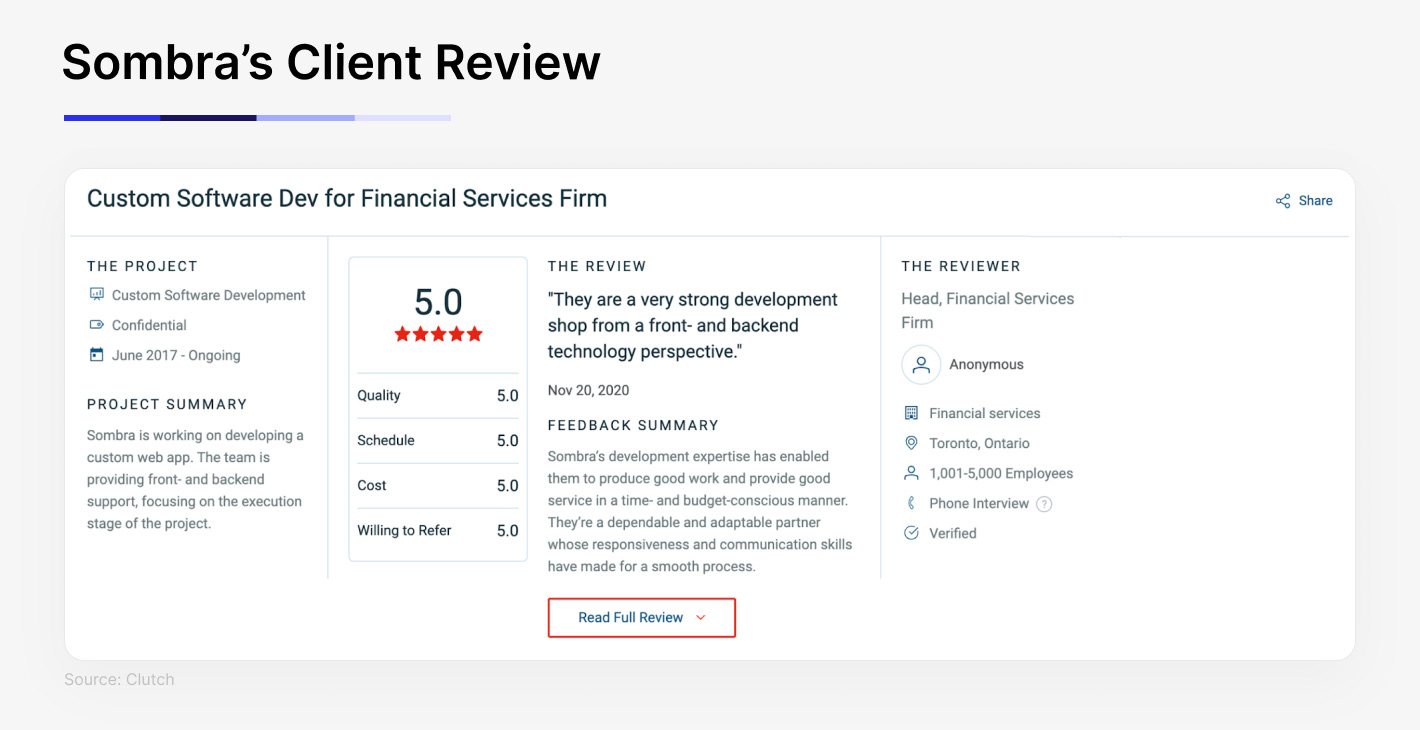
Wealthtech client’s review
Want to learn more about what it’s like to work with us? Check out our Clutch reviews to see what our clients think about the value we deliver.
Final thoughts
Wealth management companies now successfully cater to younger generations that expect instant international money transfers and are twice as likely to trust automatically generated financial advice.
The ball is now in the incumbent wealth managers’ court. With the help of wealth management software companies, they can adapt to the new normal and maintain their competitiveness, be it through cloud computing or 360-degree customer view. Or, they can fade into oblivion.
Want to gain a competitive edge in the wealthtech solution market? Contact us to discuss how Sombra can help your wealthtech platform stand out.











